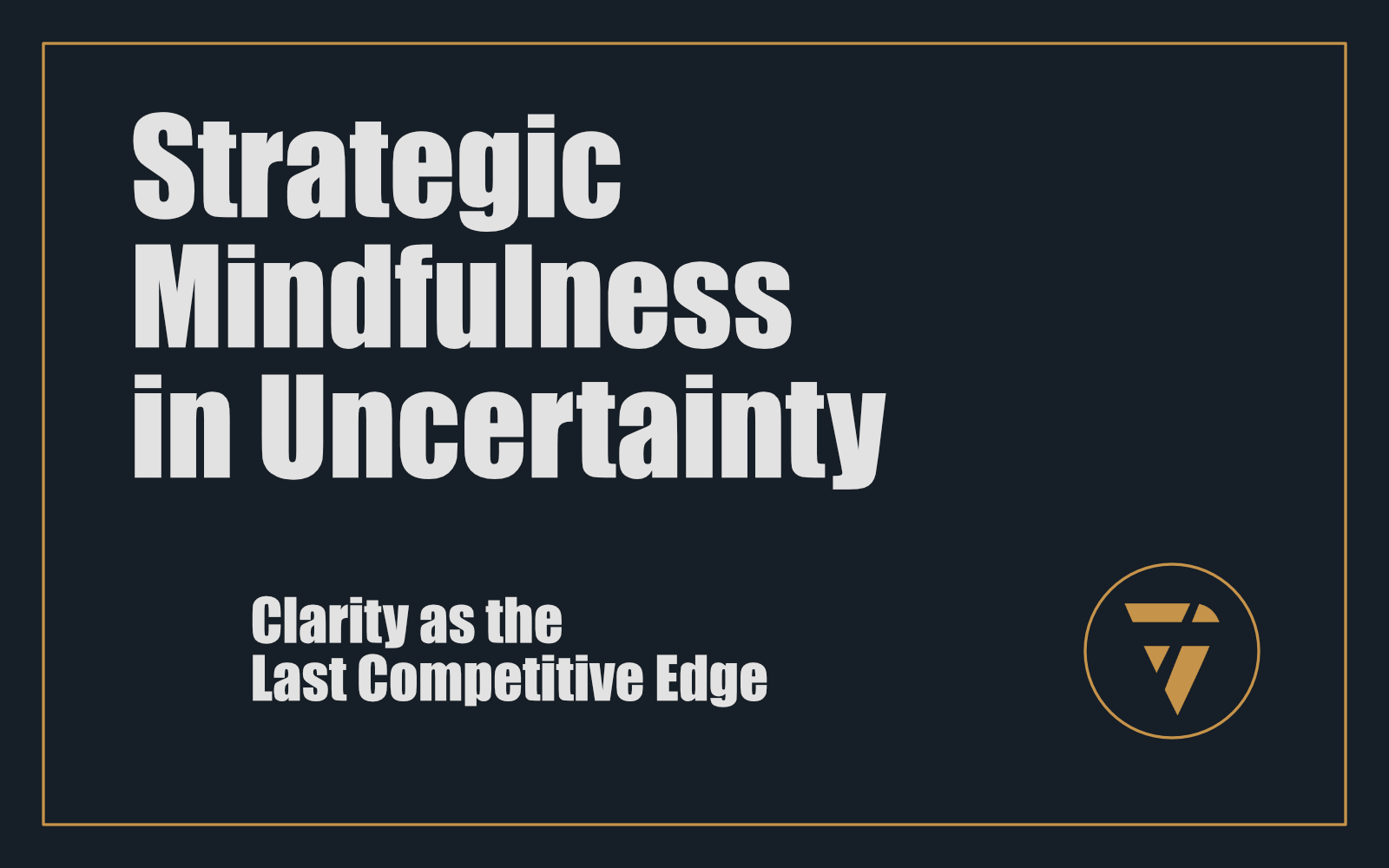Strategic Mindfulness in Uncertainty

Clarity as the Last Competitive Edge
Uncertainty is not a temporary condition. It's the new ground we walk on.
The founder who waits for stability will die waiting. The executive who bets on predictability will bet the company away. And the politician who clings to the illusion of control will find himself irrelevant, mocked, and discarded.
Markets convulse. Societies fracture. Politics devours itself. The story is always the same: what worked before no longer works, and what comes next is not yet clear. Most leaders respond to this environment with the only tool they know — more. More effort. More noise. More strategy decks. More initiatives.
They mistake motion for progress.
And in that mistake lies their collapse.
Because in uncertainty, the law is compression. Only what can see clearly and act precisely survives. Strategic mindfulness is not a suggestion for health retreats and meditation journals. It is the last durable advantage in a world where attention, trust, and power shift faster than strategy can adapt.
This series is about that law. About why presence, properly understood and deployed, is not a personal virtue, but a system-level weapon. About how clarity cuts deeper than speed. And about why awareness, disciplined and strategic, will outcompete every model built on effort.
The Mirage of Certainty
Leaders are trained to believe in predictability. Forecasts. Projections. Models. But forecasts are fiction in disguise. Projections are guesswork with a spreadsheet. Models are theatre meant to comfort shareholders and boards.
Reality does not care.
The founder who raises capital on a three-year projection is already building drift into their system. The executive who measures success by quarterly metrics is already blind to the decay beneath the surface. The politician who governs by polls is already three steps behind the narrative shaping public perception.
This addiction to certainty creates fragility. The tighter the grip on control, the easier the system breaks when the unexpected comes. And the unexpected always comes.
Strategic mindfulness begins with the opposite posture: the discipline of not needing certainty to act. To see conditions as they are, not as we hoped, and to move decisively anyway.
That posture is rare. Which is why it yields advantage.
Why “Mindfulness” Is Misunderstood
The word itself has been hijacked. Mindfulness is sold as calm. As peace. As breathing techniques in yoga studios. Leaders dismiss it as indulgent, irrelevant to the hard mechanics of business and power.
They are half right.
Meditation is not strategy. Calm is not consequence.
But true mindfulness — stripped of its soft branding — is precision of awareness. It is the trained capacity to see clearly without distortion, in real time, under pressure. That discipline is exactly what founders, executives, and political leaders lack.
They are too busy. Too distracted. Too consumed by their own noise. They can't see.
Strategic mindfulness is the opposite of indulgence. It's the deletion of illusion. It cuts out distortion. It compresses focus. And it does so not to “feel better,” but to act sharper.
The Commercial Arena: Growth Without Presence
In commerce, uncertainty destroys the unmindful operator first.
Every founder knows the temptation of noise. Growth hacking. Viral funnels. Vanity metrics. Raising rounds on projections that never meet reality. All of this is activity mistaken for progress. Drift disguised as growth.
The mindful operator plays a different game.
They see the metrics that matter: revenue, retention, lifetime value, yield per unit of effort. They see the illusions: follower counts, content reach, investor hype. They delete the noise and compress their vision down to the architecture that pays.
Strategic mindfulness in business is ruthless attention. It is the refusal to be distracted by what the market screams for today, in favour of what creates compounding consequence tomorrow.
This is why most founders collapse. They are pulled by noise, rather than anchored by presence. The mindful founder compresses their field of awareness until every decision yields more per unit of effort than the competition can achieve. That is leverage. That is survival.
The Social Arena: Trust in Collapse
Uncertainty doesn’t just break markets. It corrodes trust.
Societies now operate on attention economics. Institutions that once held authority bleed credibility daily. Media collapses into partisanship. Communities fracture along ideological lines. Truth itself becomes negotiable.
For most leaders, this creates paralysis. They do not know which signals to trust, which voices to listen to, which currents to follow.
The mindful leader doesn't chase signals. They read them.
Strategic mindfulness in society means training awareness not just on what is said, but on what is unsaid. It means seeing the mood of the market before it crystallises. It means understanding that social capital — trust, narrative, credibility — is now the hidden balance sheet beneath every transaction.
Commerce follows trust. Politics follows trust. And trust follows awareness.
Which is why, in uncertain societies, the leader who is mindful enough to read trust before it collapses can control the game long after competitors have burned their credibility.
The Political Arena: Power Behind the Theatre
Politics is distraction by design.
Cycles of outrage. Manufactured crisis. Endless theatre engineered to keep populations reactive and confused. Most leaders get caught in this cycle. They mistake the surface noise for the real game. They fight on the stage, while power moves silently backstage.
The mindful operator does not confuse the theatre for the play. They read the script beneath the performance.
Strategic mindfulness in politics is sovereignty. It's the ability to hold presence when others are consumed by distraction. It's to see where influence is truly deployed — in capital flows, in media architecture, in institutional networks — and to act from that clarity.
In politics, perception is power. The mindful leader is not controlled by it. They use it.
Clarity as Compression
The untrained mind creates complexity. The mindful system deletes it.
This is the law: in uncertainty, leverage belongs to the one who compresses. Compression of decisions. Compression of cycles. Compression of attention into what matters.
Strategic mindfulness is compression. It deletes the illusion of certainty, the addiction to noise, the paralysis of fear. It replaces them with disciplined awareness, ruthless focus, and decisive action.
And in a world of volatility, those three qualities are the only advantage left.
Consequence
This is not theory. It's not philosophy. It's architecture.
The mindful founder will outlast the frantic one.
The mindful executive will outpace the distracted one.
The mindful political operator will outmanoeuvre the theatrical one.
Clarity is no longer a luxury. It's the last competitive edge.
Which means the cost of ignoring this discipline is not stress. It's failure.
In uncertainty, you will not be rewarded for effort. You will not be rewarded for scale. You will not be rewarded for theatre.
You will only be rewarded for clarity.
This is what I’m working on. Tell me what you think, I enjoy the conversation! Subscribe and follow the work in real time.
Thanks!
B

They call it chaos. It’s not. It’s drift... noise mistaken for progress.
Strategy doesn’t die from failure, it dies from illusion.
Strategic mindfulness isn’t calm. It’s compression.
Clarity is the last competitive edge.
PS -






